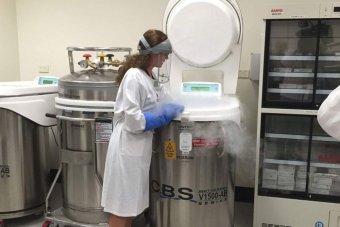The Queensland Institute of Medical Research (QIMR) has been granted permission to manufacture and trial new cancer treatments aimed at rejuvenating patient immune systems.
The QIMR is the first Australian facility licensed to produce trial T-cell therapies and the second in the country to be granted a licence to manufacture cellular therapies for human use.
Premier Annastacia Palaszczuk made the announcement at a biotechnology convention in the US city of Philadelphia.
QIMR’s lead researcher Professor Rajiv Khanna, who developed the treatments, described the approval as exciting, saying immunotherapy had great potential to target the spread of secondary cancer.
“When you are treating patients with chemo or radiotherapy, immunotherapy will become part of the normal treatment that is the ultimate goal,” he said.
“One of the major advantages of immunotherapy is it is not as nasty or has side effects that the chemotherapy or radiotherapy has.”
QIMR director and chief executive Professor Frank Gannon said the approval would allow its manufacturing facility Q-Gen to prepare therapeutics, including cytotoxic T-cell therapies, for patients with cancers such as glioblastoma multiforme (GBM) and nasopharyngeal carcinoma (NPC).
“QIMR Berghofer is focused on producing research with outcomes beyond the laboratory, and this is an excellent example of our efforts to get laboratory discoveries through clinical trials and to the hospital bedside,” he said.
Ms Palaszczuk said the Therapeutic Goods Administration’s approval for Queensland trials would have a ripple effect in attracting more researchers to the state.
“This is a huge step forward that will put the focus on Queensland and QIMR Berghofer as a global leader in the fight against cancer,” she said.
“If you needed any proof that Queensland was at the cutting edge of cancer research, this is it.”
The new cancer treatments take a patient’s immune cells from the blood and train them to recognise antigens found in particular cancers.
Once trained, the cells are reinfused back into the patient to attack the cancer.
Professor Gannon said preliminary trials had shown the therapy is safe, had no major side effects and could be effective against virus-specific tumours.

